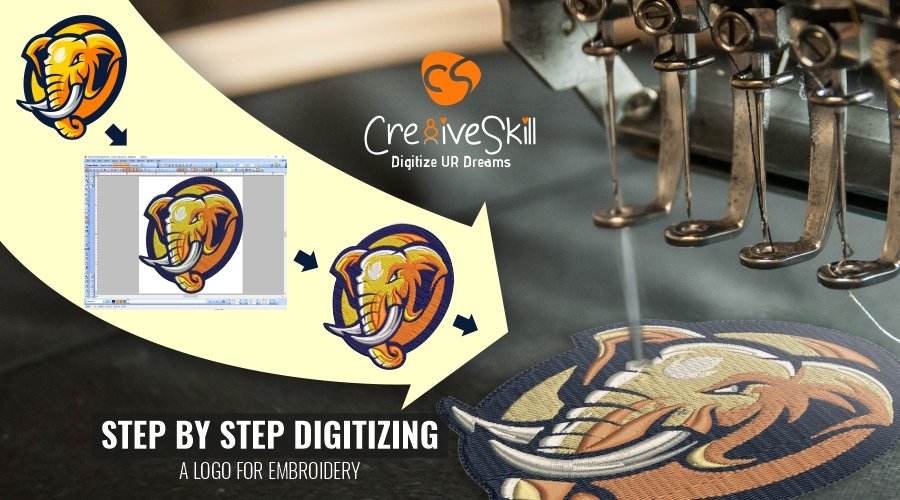Check Out Various Types of Needlework Digitizing Techniques
Needlework digitizing has actually advanced substantially over the years, providing a myriad of strategies to bring styles to life in the digital realm. The world expands to much more sophisticated methods like photorealistic needlework digitizing and the fascinating world of 3D needlework digitizing.
Standard Hand Needlework Digitizing
Conventional hand embroidery digitizing entails the process of converting elaborate hand-stitched designs into digital styles for maker needlework. This method needs knowledgeable craftsmens to meticulously examine the handcrafted style and after that make use of specialized software to recreate it in a digital layout. Each stitch, color, and detail must be carefully converted to make certain that the significance of the initial hand embroidery is preserved in the electronic variation.
One of the essential challenges of conventional hand embroidery digitizing is recording the ins and outs and nuances of the handmade style. Digitizing for Embroidery. Artisans should possess a deep understanding of various embroidery techniques, such as satin stitch, chain stitch, and French knots, to properly duplicate these methods in the digital world. In addition, they require to have a keen eye for detail to ensure that the electronic layout keeps the exact same level of creativity and workmanship as the initial hand-stitched piece
Punching Method
To seamlessly change from standard hand needlework digitizing to the punching strategy, artisans have to now concentrate on converting the complex digital styles into directions that needlework devices can analyze. The punching method involves utilizing specialized software to produce electronic files which contain commands for the embroidery maker to follow. This process calls for a deep understanding of not just the style itself yet also the abilities and constraints of the embroidery machine.

Auto-Digitizing Software Application Programs
Needlework digitizing has actually been revolutionized by the introduction of auto-digitizing software application programs, supplying craftsmens with advanced tools to convert electronic layouts right into needlework machine instructions efficiently. Auto-digitizing software application utilize algorithms to evaluate digital pictures or vector data and produce embroidery styles immediately. These programs permit fast and exact conversion of intricate designs into stitch patterns, saving time and effort for embroiderers.
One of the essential benefits of auto-digitizing software program is its user-friendly interface, making it accessible to both beginners and experienced digitizers. These programs typically include features such as stitch modifying tools, thread color matching, and the ability to preview the final stitched design. Additionally, auto-digitizing software program can handle complicated styles with numerous colors and elaborate details, generating click here for more high-quality needlework documents suitable for various garments and textile projects.
While auto-digitizing software program provides convenience and performance, it is important for customers to recognize the restrictions of automated digitizing. Fine-tuning and hands-on adjustments might still be required to attain the wanted needlework quality, specifically when taking care of elaborate or unique styles. By leveraging the capabilities go to this site of auto-digitizing software program together with manual digitizing strategies, artisans can improve their embroidery digitizing procedure and produce stunning stitched pieces.
Photorealistic Needlework Digitizing
Using innovative electronic imaging methods, attaining photorealistic outcomes in needlework digitizing has ended up being a desired skill amongst modern artisans. This method entails converting high-resolution pictures right into detailed stitch patterns that carefully resemble the initial design, causing embroidery pieces that exhibit natural detail and depth.
To accomplish photorealistic needlework digitizing, craftsmens must possess a keen eye for detail and a comprehensive understanding of exactly how various stitch kinds and thickness can influence the last outcome. By thoroughly mapping out each color and shade in the picture, embroiderers can produce an electronic documents that overviews the embroidery device to duplicate the nuances of the original photo properly.
Photorealistic needlework digitizing is especially popular in creating customized styles for clothing, home decoration, and art items where recording the essence of a photograph or art work is crucial. This strategy permits craftsmens to transform memories, landscapes, portraits, and elaborate art work right into stunning embroidered masterpieces that showcase a blend of typical craftsmanship and advanced innovation.
3D Embroidery Digitizing
With the improvement you could try these out of electronic imaging strategies in achieving photorealistic cause embroidery digitizing, the exploration of 'D Embroidery Digitizing' uses a brand-new measurement to the ins and outs of layout duplication. 'D Embroidery Digitizing' describes the three-dimensional digitizing method that adds depth and texture to embroidery layouts, creating an extra realistic and visually appealing last product. This strategy makes use of software program that simulates the effect of light and shadow on the needlework layout, improving its overall visual influence.
Among the essential benefits of 'D Needlework Digitizing' is its capability to make designs look more natural and vibrant. By adding deepness to the needlework layout, the final product appears extra practical and exciting (Digitizing for Embroidery). Furthermore, this method permits even more innovative flexibility in layout execution, enabling embroiderers to experiment with various textures and results that were previously challenging to attain
Final Thought

Comments on “High-grade Digitizing for Embroidery: Specialist Workmanship”